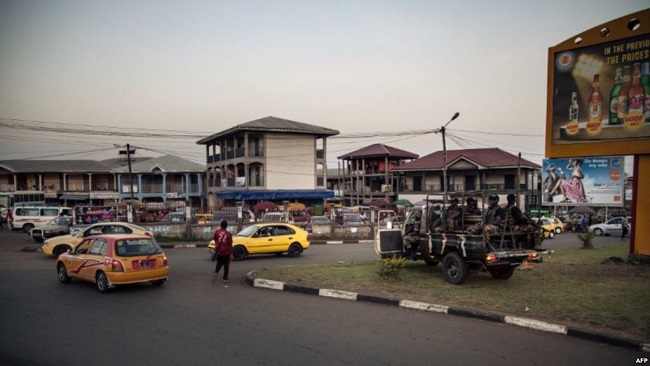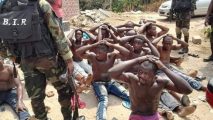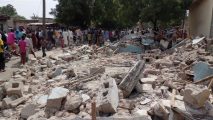23, March 2019
Battle for Ambazonia: Anglophone Catholic bishops call for peace 0
Catholic leaders in the English-speaking parts of Cameroon have called on all parties to respect human life, as the ongoing Anglophone crisis continues to wreck the region.
In a lengthy Lenten message, the Archbishop of the Bamenda, Cornelius Fontem Esua, and his auxiliary, Bishop Michael Miabesue Bibi said all life is sacred, even in times of conflict.
About 80 percent of Cameroon is French-speaking. However, the Northwest and Southwest regions of Cameroon are majority English-speaking, a legacy of the colonial history of the country: Cameroon was originally German, but after World War I the defeated country transferred it to the Allies, and it was divided between France and Britain.
At independence, the two parts were reunited, and currently about 20 percent of the country’s nearly 25 million people is Anglophone. The Catholic Church is the largest religious group in the country, representing about 40 percent of all Cameroonians.
In October 2016, strikes by lawyers and teachers over perceived attempts by the Francophone administration to assimilate the legal and educational systems practiced in the two English-speaking regions turned violent, and morphed into rising demands by Anglophone Cameroonians for independence.
The government has been accused of razing entire villages and extrajudicial killings in their hunt for separatists, who are calling on the English-speaking areas to form a new country, called ‘Ambazonia.’
The United Nations estimates nearly 500,000 refugees and internally displaced persons have fled their homes in the region due to the conflict.
“Since the beginning of the crisis of the Anglophone Problem which escalated on November 21, 2016, there has been increasing and rampant profanation and disrespect of human life and the dignity of the human person,” the bishops wrote.
“This has taken unimaginable and alarming proportions. Violence has become common place because of the frequent confrontations between the military and the secessionists. Nearly every day we hear gunshots which are now jokingly referred to as ‘popcorn’ from various corners of our towns and villages. There is indiscriminate killing of innocent people with impunity. It seems that human life has lost its value and sacredness and the dignity of the human being is rubbed in mud,” the statement continued.
The prelates said they couldn’t understand why hospitals and health facilities are “vandalized,” and condemned the continued violation of human rights “with impunity in such a way that some wounded persons are denied medical care and are taken away from hospitals and health centers for summary extra judicial execution.”
They blasted the protagonists in the conflict for engaging in “cold-blooded killings,” and for celebrating such violence.
“In fact, people are quick to kill those they suspect or consider as their enemies. The breaking into houses, the burning of houses, leaving hundreds of people homeless, and the looting and burning of property no longer make news. Some men and women, students and teachers, parents and children, religious men and women are not only molested but kidnapped for ransom. Life seems to be valueless and meaningless,“ the bishops said.
They also expressed concern about the “frightening disrespect for the dead.”
“The corpses of some of those who have been killed are thrown into streams and rivers or dumped near others’ compounds to make them suspects. Some of those killed are burnt to ashes. We have seen dead bodies with heads, legs or other parts of their bodies chopped off. It has now become normal to hear an announcement over radio that there are unidentified corpses in the Bamenda Regional Hospital Mortuary. It is now not unusual to see fresh or decomposing dead bodies on the public highway. A lot of disrespectful things have been and are being done on dead bodies. Many people have been prevented from taking and burying their loved ones. All this is against the sacredness and dignity of the human person. This is unheard of in our African tradition where the dead are venerated,” wrote the bishops.
The way forward
Esua and Bibi said only an inclusive dialogue can put an end to the mayhem in the country’s English-speaking regions. For that to happen there is need for the parties to “put down their arms, stop this senseless fratricidal and suicidal war and have the courage to enter into dialogue with one another.”
They blasted the government’s approach to resolving the crisis, noting that “violence and the approach of ‘neutralizing’ the secessionists is not the right solution because violence only begets violence.”
The two prelates appealed “to the competent authorities that the military should desist from the wanton killing of innocent civilians and the burning down of houses which is the basic cause of the displacement of the populations.”
They pleaded that “there may be no more delay in addressing effectively the real causes of the present crisis.”
The bishops called on the separatists and “other armed groups which are exploiting the situation to refrain from the use of violence and stop shedding the blood of their brothers and sisters which like the blood of Abel is crying out to God from the ground.”
Esua and Bibi also expressed concern about the fact that children are being deprived of their fundamental right: The right to education.
The separatists have called for a boycott of all schools in the region and enforced it with violence.
Emphasizing the importance of education as “the indispensable instrument of the liberation and development of the human person,” the bishops insisted that the best way of preparing a better future cannot be by “stopping our children from going to school.”
Source: Crux






























23, March 2019
Roman Catholic priest assassinated in French Cameroun 0
Fr Toussaint Zoumalde, Superior of the Capuchins in Chad and the Central African Republic, died a few days ago after being stabbed at Ngaoundere in the Francophone part of neighbouring Cameroon. He was travelling from Bouar in the Central African Republic where he had conducted a training course, back to his community in Chad.
Fr Zoumalde, who was originally from Bouar, spent the night of 19 March in diocesan premises and was found in a pool of blood nearby the next day. It is suspected that Fr Zoumalde was killed by an anti-government rebel group but it is hard to pin responsibility for such incidents.
Fr. Toussaint (born in 1971) had worked extensively as a journalist for Radio Siriri, of the diocese of Bouar, and composed several religious songs.
In the last two days a number of incidents took place in the Anglophone regions of Cameroon: a football coach was kidnapped and released in Bamenda, a former government minister was kidnapped nearby, a football team of 15 was kidnapped at Buea University and 80 people travelling by bus from Buea to Kumba were detained in their bus from 9 am to 5 pm. These are assumed to be actions by separatists.
The news has thrown into despair all the religious communities of Central Africa and all the people who have known him. Internally, in Cameroon, there are tensions over the two mainly English-speaking south-western provinces. A secessionist movement emerged in the 1990s, and turned into an insurgency in 2016.
Source: Independent Catholic News